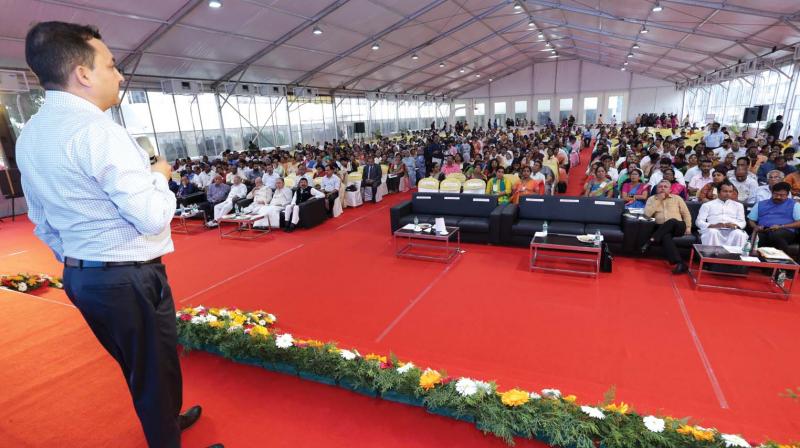Kochi: Winds of change in schools

Kochi: Winds of change are blowing across our classrooms. After the unsuccessful experiments with Continuous and Comprehensive Evaluation (CCE), the Central Board of Secondary Education (CBSE) is combining the best elements of CCE with a modified version of the traditional mode to give a new direction to the classrooms.
CBSE secretary Anurag Tripathi unveiled the CBSE agenda at a conference of principals organised by Venad Sahodaya Complex at Greets Public School here last week.
Calling on teachers to turn their classrooms into one of experiential learning rather than learning by rote, Anurag Tripathi reminded them that the children have to be skilled rather than just taught to meet the challenges of the modern world.
He also asked the teachers to connect emotionally with the children and improve their communication skills and their scientific temper. “CBSE schools have good infrastructure and the focus should be on conducting capacity-building programmes for teachers to achieve the objective,” he told the managers who were also present at the conclave.
According to Radha Viswakumar, principal, Bhavan’s Vidya Mandir, Manvila, Thiruvanantha-puram, to a certain extent classrooms have been implementing the concept for sometime now. “In fact, new terms like experiential learning describe them. After CCE was introduced sometime ago, activity-based learning got prominence,” said Radha Viswakumar.
With certain schools not implementing the CCE in letter and spirit and the CBSE not being able to implement it uniformly, the CCE couldn’t succeed. “There were allegations that some schools awarded 40 out of 100 marks for activity without the wards doing anything while the CBSE couldn’t effectively monitor this. The system being enforced now is moving a bit away and taking the board exams close to competitive exams which is certainly welcome,” she said.
With multiple choice exams also getting enough share out of the 80 marks for theory exams, students will be forced to learn concepts thoroughly and they will be able to fare well in entrance exams without going to coaching centres. “Schools should focus on conducting periodic assessment creatively as 10 out of the remaining 20 marks for activity are set apart for it. We are focusing on improving the critical thinking, problem solving, analysing info and effective communication of the wards,” she said.
Deepa Chandran, principal of Greets Public School, Kochi, the host school of the conference, said that the Centre of Excellence (CoE) of CBSE in Thiruvanana-nthapuram had already initiated a series of workshops to equip teachers to deliver the kind of experiential learning it wants in the classrooms. “The CBSE wants the learning to be a joyful process. Recently, we took KG children to a mall after asking the parents to give them Rs 50 or Rs 100. Our idea was to enable them to give the money and purchase small things and calculate the maths in it as they receive the balance. While studying geography or history, it is important to take students to places in the state at least. These visits take them beyond classrooms for learning and the new learning process envisages equipping children in such ways possible,” said Deepa Chandran, who is also a master trainer of the CBSE.
“The CBSE has now identified teachers as pedagogical leaders. They cannot leave any student behind and they have to come to the level of the students to understand them and impart lessons. Delivering to each student as per his/her ability to grasp is the task of the teacher and he or she cannot take them as one lot for granted. Learning has to be hands on and minds on,” she said.
The CBSE is infusing the new thinking from primary levels. At the higher levels, it is bringing the multiple choice questions to increase the efficiency of students, she added.

